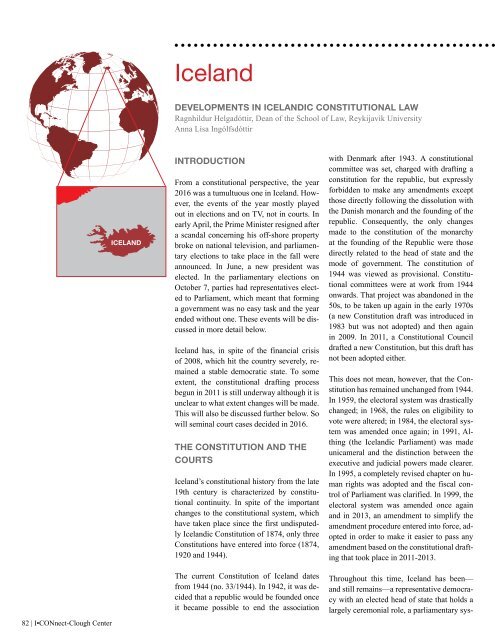2016 Global Review of Constitutional Law
I-CONnect–Clough Center collaboration.
I-CONnect–Clough Center collaboration.
Create successful ePaper yourself
Turn your PDF publications into a flip-book with our unique Google optimized e-Paper software.
Iceland<br />
DEVELOPMENTS IN ICELANDIC CONSTITUTIONAL LAW<br />
Ragnhildur Helgadóttir, Dean <strong>of</strong> the School <strong>of</strong> <strong>Law</strong>, Reykijavik University<br />
Anna Lísa Ingólfsdóttir<br />
82 | I•CONnect-Clough Center<br />
ICELAND<br />
INTRODUCTION<br />
From a constitutional perspective, the year<br />
<strong>2016</strong> was a tumultuous one in Iceland. However,<br />
the events <strong>of</strong> the year mostly played<br />
out in elections and on TV, not in courts. In<br />
early April, the Prime Minister resigned after<br />
a scandal concerning his <strong>of</strong>f-shore property<br />
broke on national television, and parliamentary<br />
elections to take place in the fall were<br />
announced. In June, a new president was<br />
elected. In the parliamentary elections on<br />
October 7, parties had representatives elected<br />
to Parliament, which meant that forming<br />
a government was no easy task and the year<br />
ended without one. These events will be discussed<br />
in more detail below.<br />
Iceland has, in spite <strong>of</strong> the financial crisis<br />
<strong>of</strong> 2008, which hit the country severely, remained<br />
a stable democratic state. To some<br />
extent, the constitutional drafting process<br />
begun in 2011 is still underway although it is<br />
unclear to what extent changes will be made.<br />
This will also be discussed further below. So<br />
will seminal court cases decided in <strong>2016</strong>.<br />
THE CONSTITUTION AND THE<br />
COURTS<br />
Iceland’s constitutional history from the late<br />
19th century is characterized by constitutional<br />
continuity. In spite <strong>of</strong> the important<br />
changes to the constitutional system, which<br />
have taken place since the first undisputedly<br />
Icelandic Constitution <strong>of</strong> 1874, only three<br />
Constitutions have entered into force (1874,<br />
1920 and 1944).<br />
The current Constitution <strong>of</strong> Iceland dates<br />
from 1944 (no. 33/1944). In 1942, it was decided<br />
that a republic would be founded once<br />
it became possible to end the association<br />
with Denmark after 1943. A constitutional<br />
committee was set, charged with drafting a<br />
constitution for the republic, but expressly<br />
forbidden to make any amendments except<br />
those directly following the dissolution with<br />
the Danish monarch and the founding <strong>of</strong> the<br />
republic. Consequently, the only changes<br />
made to the constitution <strong>of</strong> the monarchy<br />
at the founding <strong>of</strong> the Republic were those<br />
directly related to the head <strong>of</strong> state and the<br />
mode <strong>of</strong> government. The constitution <strong>of</strong><br />
1944 was viewed as provisional. <strong>Constitutional</strong><br />
committees were at work from 1944<br />
onwards. That project was abandoned in the<br />
50s, to be taken up again in the early 1970s<br />
(a new Constitution draft was introduced in<br />
1983 but was not adopted) and then again<br />
in 2009. In 2011, a <strong>Constitutional</strong> Council<br />
drafted a new Constitution, but this draft has<br />
not been adopted either.<br />
This does not mean, however, that the Constitution<br />
has remained unchanged from 1944.<br />
In 1959, the electoral system was drastically<br />
changed; in 1968, the rules on eligibility to<br />
vote were altered; in 1984, the electoral system<br />
was amended once again; in 1991, Althing<br />
(the Icelandic Parliament) was made<br />
unicameral and the distinction between the<br />
executive and judicial powers made clearer.<br />
In 1995, a completely revised chapter on human<br />
rights was adopted and the fiscal control<br />
<strong>of</strong> Parliament was clarified. In 1999, the<br />
electoral system was amended once again<br />
and in 2013, an amendment to simplify the<br />
amendment procedure entered into force, adopted<br />
in order to make it easier to pass any<br />
amendment based on the constitutional drafting<br />
that took place in 2011-2013.<br />
Throughout this time, Iceland has been—<br />
and still remains—a representative democracy<br />
with an elected head <strong>of</strong> state that holds a<br />
largely ceremonial role, a parliamentary sys-


